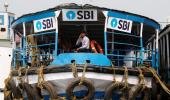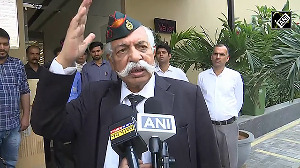The total default is said to be in excess of Rs 3,000 crore — making this the largest default by a broker.

The National Stock Exchange (NSE) has declared Karvy Stock Broking a ‘defaulter’, paving the way for clients of the beleaguered broking firm to make claims with the exchange to recover their dues.
Once a trading member is declared a defaulter, a stock exchange can pay the clients from the investor protection fund (IPF) kitty.
The Hyderabad-based firm is alleged to have misused securities belonging to its clients.
The total default is said to be in excess of Rs 3,000 crore — making this the largest default by a broker.
However, last week, NSE settled funds and securities worth Rs 2,300 crore belonging to 235,000 clients.
Sources said the current shortfall is between Rs 400 crore and Rs 800 crore.
“There is a dispute between banks and Karvy over securities pledged.
"If the court rules in favour of Karvy, then the extent of default could be about Rs 400 crore,” said a person with knowledge of the development.
About 90,000 clients of Karvy are yet to get their dues.
Of this, about 7,000 have come forward to claim about Rs 230 crore, said sources.
NSE is expected to take out an advertisement appealing to Karvy’s clients to make claims, if any.
The exchange can pay up to Rs 25 lakh per client from the IPF, provided certain conditions are met.
Unlike a bank default, where the borrower fails to repay the lender, most broker defaults are more on account of misuse of client securities or funds.
Most of these instances occurred last year, when brokers had access to client shares through power of attorney.
Brokers who defaulted in 2019 had pledged securities belonging to their clients to raise funds for other businesses or to provide higher trading margin to other clients.
After the Karvy episode came to light in December 2019, market regulator Securities and Exchange Board of India (Sebi) has put in place rules that prevent brokers from gaining access to client shares.
It took NSE almost a year to declare Karvy a defaulter.
Industry players said the process is fairly lengthy as the exchange has to issue notices to the broker, give time for it to make good the shortfall and also provide an opportunity to present its case.
Karvy has the option of challenging NSE’s move before the Securities Appellate Tribunal (SAT), which is also hearing an appeal by leading banks that had given loans to Karvy.
Photograph: Danish Siddiqui/Reuters













 © 2025
© 2025